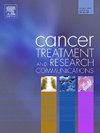研究晚期胃癌中细胞因子水平与预后因素的相关性:一项系统综述和荟萃分析
IF 2.4
Q3 Medicine
引用次数: 0
摘要
背景晚期胃癌(AGC)的侵袭性和不良预后需要了解其分子驱动因素。肿瘤微环境中的细胞因子影响肿瘤行为,本研究旨在分析其表达水平,并将其与AGC患者的临床结局联系起来,以提高对预后的认识。方法在截至2023年10月31日的PubMed和谷歌Scholar数据库中检索评估AGC细胞因子水平的原始研究。使用RevMan 5.4.1分析治疗后的生存结果,包括5年生存率,重点是OS, PFS,转移和肿瘤分期进行进一步评估。结果IL-17与AGC患者PFS改善之间存在显著相关性(P < 0.00001)。然而,IL-2 (P = 0.22)、IL-4 (P = 0.39)、IL-10 (P = 0.22)、IL-6 (P = 0.14)和ifn - γ (P = 0.85)对PFS的影响无统计学意义。值得注意的是,IL-17 (P < 0.00001)和IL-6 (P < 0.00001)对AGC患者的OS有重大影响。相反,总体效应检验未显示ifn - γ对OS的显著性(P = 0.95)。此外,伴有和未伴有转移的AGC患者IL-10和IL-17的表达差异无统计学意义(P = 0.64和0.11),晚期(III-IV)和早期(I-II)患者IL-6的表达差异无统计学意义(P = 0.13)。结论IL-17水平升高与AGC患者PFS缩短有关。IL-17和IL-6均显著影响OS,较高水平的IL-17和IL-6与较差的OS结果相关,而其他细胞因子则没有影响。细胞因子在AGC中的预后作用有待进一步研究。研究注册普洛斯彼罗ID(CRD42024556571)本文章由计算机程序翻译,如有差异,请以英文原文为准。
Investigating the correlation between cytokine levels and prognostic factors in advanced gastric cancer: A systematic review and meta-analysis
Background
Advanced gastric cancer (AGC) aggressiveness and poor prognosis necessitate understanding its molecular drivers. Cytokines in the tumor microenvironment influence tumor behavior, and this study aims to analyze their expression levels and correlate them with clinical outcomes in AGC patients to enhance prognostic understanding.
Method
Original studies evaluating cytokine levels in AGC were searched in PubMed and Google Scholar databases up to October 31, 2023. Survival outcomes post-treatment, including five-year survival rates, were analyzed using RevMan 5.4.1, with a focus on OS, PFS, metastasis, and tumor stage for further evaluation.
Results
The results indicate a significant association between IL-17 and improved PFS in individuals with AGC (P < 0.00001). However, no statistically significant effects were observed for IL-2 (P = 0.22), IL-4 (P = 0.39), IL-10 (P = 0.22), IL-6 (P = 0.14), and IFN-gamma (P = 0.85), on PFS. Notably, IL-17 (P < 0.00001) and IL-6 (P < 0.00001) were found to have a substantial impact on OS in AGC patients. Conversely, the overall effect test did not show significance for IFN-gamma on OS (P = 0.95). Furthermore, there were no significant differences in IL-10 and IL-17 expression detected between AGC patients with and without metastasis (P = 0.64 and 0.11), nor in IL-6 levels between advanced (III-IV) and early stage (I-II) patients(P = 0.13).
Conclusion
Elevated levels of IL-17 were linked to shorter PFS in AGC. Both IL-17 and IL-6 affected OS significantly, with higher levels associated with poorer OS outcomes, while other cytokines did not. Further research is needed on the prognostic role of cytokines in AGC.
Study registration
Prospero ID(CRD42024556571)
求助全文
通过发布文献求助,成功后即可免费获取论文全文。
去求助
来源期刊

Cancer treatment and research communications
Medicine-Oncology
CiteScore
4.30
自引率
0.00%
发文量
148
审稿时长
56 days
期刊介绍:
Cancer Treatment and Research Communications is an international peer-reviewed publication dedicated to providing comprehensive basic, translational, and clinical oncology research. The journal is devoted to articles on detection, diagnosis, prevention, policy, and treatment of cancer and provides a global forum for the nurturing and development of future generations of oncology scientists. Cancer Treatment and Research Communications publishes comprehensive reviews and original studies describing various aspects of basic through clinical research of all tumor types. The journal also accepts clinical studies in oncology, with an emphasis on prospective early phase clinical trials. Specific areas of interest include basic, translational, and clinical research and mechanistic approaches; cancer biology; molecular carcinogenesis; genetics and genomics; stem cell and developmental biology; immunology; molecular and cellular oncology; systems biology; drug sensitivity and resistance; gene and antisense therapy; pathology, markers, and prognostic indicators; chemoprevention strategies; multimodality therapy; cancer policy; and integration of various approaches. Our mission is to be the premier source of relevant information through promoting excellence in research and facilitating the timely translation of that science to health care and clinical practice.
 求助内容:
求助内容: 应助结果提醒方式:
应助结果提醒方式:


